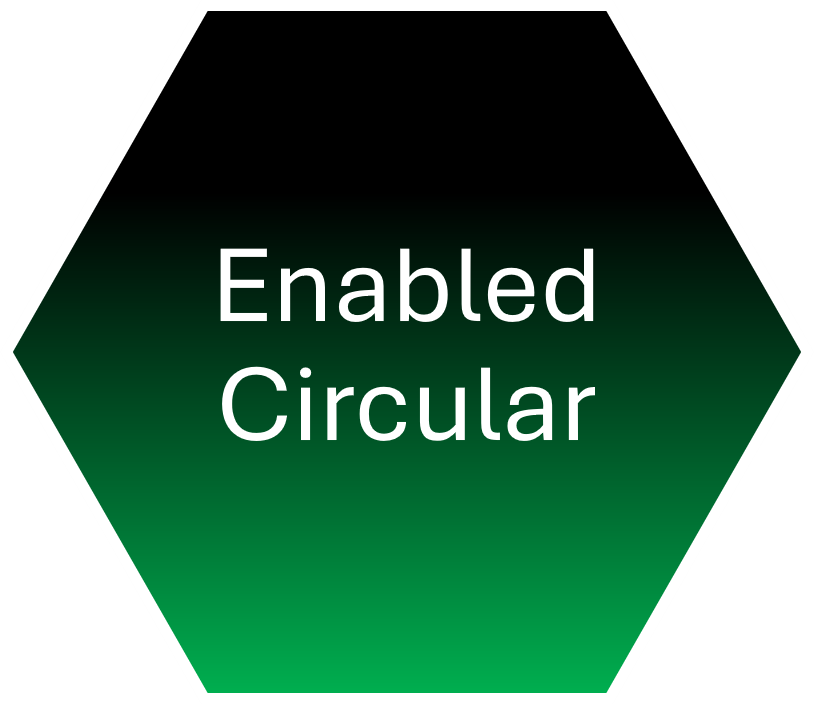EnabledCircular

The EnabledCircular Sector Hexagon covers consulting on Circular Economy projects for sustainable production and recycling of plastics, rubbers, composites, fibres, foams, coatings, adhesives, sealants and elastomers (CASE). In addition, it houses projects for abatement and utilisation of waste, CO2 and other Greenhouse Gases (GHG) via catalytic and non-catalytic methods.
Multiple routes are required to achieve a full Circular Industry concept and a deep understanding of the consequences of changing feedstocks and processes is required to guarantee an overall environmental benefit. Often marketing of a particular “environmentally friendly” concept is very strong, but the reality of its ecological benefits over time are often seen to fall short of expectations.
EnabledCircular projects take a holistic and objective view of the technologies available and utilises the Ecological, Economical, Social and Technological (EEST) approach to model and compare each of the solutions available. We also look to the principles of the Waste Hierarchy and 5R Approaches, with prioritisation of reduce, reuse and repurpose whenever possible. This pragmatism and depth of analysis provides a strong basis for stakeholders upon which to make the best investment decisions.
Examples of projects carried out to date by EnabledFuture are listed below:
Consulting Projects
- “Independent expert evaluation of circular economy project proposals”, (European Commission), 2019-2022
- “Technology landscape for leather recycling”, (Private Client), 2021
- “CYP450 Enzymes for production of sustainable fine chemicals”, (Private Client), 2021
- “Production of circular economy chemicals from plastic pyrolysis oil”, (Private Client), 2020
- “Market dynamics for speciality chemicals from waste oleochemical feeds”, (Private Client), 2020
- “Steel off-gas CO2 utilization options”, (Private Client), 2020
“CO2 utilisation options from a hard to abate industrial emitter”, (Private Client), 2019
Multi-Client Services
- “CO2CC Project Management“, TCGR, 2019-2024
- “Carbon Dioxide Start-ups for Venture Capital“, (TCGR), 2017
Training & Public Speaking
- “Decarbonisation of Chlor-Alkali Value Chain Chemicals”, (European Chlor-Alkali Industry Summit), 2019
- “How BASA and EFL can work together for a greener future“, (BASA Open Industry Forum), 2018
- “Toxic Air Pollutants, from global problem to chemical resource”, (EU Public Policy Exchange), 2018
Thought Leadership
- “Market dynamics for sustainable glycerol carbonate“; Private Client, 2023
- “A Techno-Economic Overview of Fouling in Steam Crackers and Available Solutions“, (Tube Tech), 2019
- “White Paper: Options for greening the polyurethane value chain using advanced catalysts“, (Econic Technologies), 2017
To inquire about EnabledCircular’s services please contact us
Back to Sector Hexagons

EnabledCircular News Insights
New FCA report published on Sustainability Disclosure Requirements (SDR) and investment labels
4th November, 2022
An important consultation paper has been published by the UK Financial Conduct Authority (FCA) setting out proposals in line with the proposed UK Sustainability Disclosure Requirements (“SDR”). The proposed changes to rules are aimed at tackling so-called “greenwashing” and to improve wider trust in sustainable products. The proposals cover different measures including labelling; transparency aimed at enabling consumers and investors to understand sustainability-related features of products; clear and fair sustainable-related product claims; ongoing product environmental performance measures; reporting on management of risks and opportunities and stricter use of terminology in marketing materials.
The measures will have far reaching effects on the market for sustainable products which are relatively under-regulated, not just in the UK. Chemical companies, for instance producing biodegradable products, personal care ingredients and many other consumer products need to consider the potential risks and opportunities which could arise as a result of the new rules. Stakeholders have been invited to provide feedback by 25 January 2023 and the final rules will be published by Q2, 2023.
The Circular Economy – scale is the enemy, but is recycling your friend?
3rd November, 2022
Circular Economy processes are a key tool for reducing carbon footprints, but the reverse doesn’t hold true. The chemical industry is making its products in ever higher quantities with key building blocks such as ethylene, propylene and para-xylene moving to multi-megaton scale plants. It is no surprise that in spite of the marketing around green packaging, many drinks companies including Coca-Cola, Pepsi-Co and others have yet to reduce their total consumption of virgin fossil feedstocks – the market for their products is simply growing faster than the non-virgin content can be added.
Plastics recycling has come under fire from NGO’s including Greenpeace whose recent publication reported that just 5-6% of U.S. plastics are being recycled and dismissed plastics recycling as a “dead-end”. The report has a point given that the rate of recycling has not made enough progress – although many companies are working on scaling their processes and in future there will undoubtedly be more capacity on line. Undoubtedly plastic packaging causes a terrible global burden in terms of ocean and land waste, and while it can be substituted, the culture of “single-use” remain to be tackled – paper bags are not nearly as reusable as plastic. This is compounded by the rise in use of mobile phone apps to order food on-demand – which further proliferates the single-use packaging culture.
Plastic in non-packaging applications is ubiquitous – from electronics, medical, construction, transport and so many thousands of uses, there is no practical way to eliminate most of it, therefore chemical recycling has to remain part of the toolkit for dealing with end-of-life plastics, once all refuse and reduce options have been exhausted.

EnabledCircular Patent Spotlights
- Protected: Demystifying ESG and its Application in Sustainable ManufacturingThis content is password protected.
- Protected: Market Dynamics for Sustainable Glycerol CarbonateThis content is password protected.
- Protected: Opinion Piece – Three Traps that Turn Your Best Work into Group FailsThis content is password protected.
- Protected: Team Repair: a circular programme teaching children how to repair electronic productsThis content is password protected.